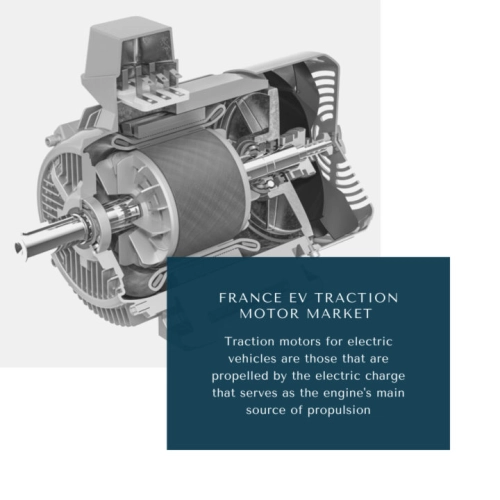
- Get in Touch with Us

Last Updated: Apr 25, 2025 | Study Period: 2022-2027
Traction motors for electric vehicles are those which are driven by the electric charge which is the main driving force of the engine.
Electric vehicle traction motor engines are often used in rail cars that are driven by electricity as well as a variety of other machineries such as conveyors, roller coasters, elevators, and other engines where a certain degree of torque is needed.

Electric traction motors are used to power trains, trams, metros, and a variety of other vehicles in modern times. Electric motors have long been utilised in a wide variety of applications.
Due to growing worries over GHG emissions, electric cars will become more and more important over time. Many nations and international leaders are encouraging e-mobility to reduce carbon emissions and dependency on internal combustion engines.
The France EV Traction Motor Market accounted for $XX Billion in 2021 and is anticipated to reach $XX Billion by 2026, registering a CAGR of XX% from 2022 to 2027.
The Renault Group, Valeo, and Valeo Siemens eAutomotive have announced the signing of a memorandum of understanding to create strategic cooperation for the design, joint research, and French manufacturing of a new generation of automobile electric motors that do not require rare piles of earth.
In order to create an electric drivetrain system that is unmatched globally and provides greater power on less energy without the usage of rare earth, the three partners will pool their knowledge and well-acknowledged experience.
Each of the three partners will make a contribution to the creation and manufacture of the rotor and stator, the two essential components of the electric motor, as part of this cooperation.
The first companies to mass build a 200kW electric motor without utilising rare earth are the Renault Group, Valeo, and Valeo Siemens eAutomotive.
The future of the Renault plants in the Hauts-de-France area has been decided upon by an agreement between Renault Group and the representative trade unions (CFDT, CFE-CGC, CFTC, CGT, FO, and SUD).
In accordance with this agreement, Renault SAS establishes Renault ElectriCity, a legal company that is entirely owned by Renault SAS and that unites the industrial sites in Douai, Maubeuge, and Ruitz, which together employ close to 5,000 people.
Renault Group hopes to build 400,000 electric vehicles annually at these sites, making them the most competitive and effective production facility for electric vehicles in Europe.
The closeness of the Group's partners is a necessary prerequisite for success, thus Renault Group will seek to highlight the benefits of situating the battery plant project as well as other partners who are manufacturing electric car components close by.
| Sl no | Topic |
| 1 | Market Segmentation |
| 2 | Scope of the report |
| 3 | Abbreviations |
| 4 | Research Methodology |
| 5 | Executive Summary |
| 6 | Introduction |
| 7 | Insights from Industry stakeholders |
| 8 | Cost breakdown of Product by sub-components and average profit margin |
| 9 | Disruptive innovation in the Industry |
| 10 | Technology trends in the Industry |
| 11 | Consumer trends in the industry |
| 12 | Recent Production Milestones |
| 13 | Component Manufacturing in US, EU and China |
| 14 | COVID-19 impact on overall market |
| 15 | COVID-19 impact on Production of components |
| 16 | COVID-19 impact on Point of sale |
| 17 | Market Segmentation, Dynamics and Forecast by Geography, 2022-2027 |
| 18 | Market Segmentation, Dynamics and Forecast by Product Type, 2022-2027 |
| 19 | Market Segmentation, Dynamics and Forecast by Application, 2022-2027 |
| 20 | Market Segmentation, Dynamics and Forecast by End use, 2022-2027 |
| 21 | Product installation rate by OEM, 2022 |
| 22 | Incline/Decline in Average B-2-B selling price in past 5 years |
| 23 | Competition from substitute products |
| 24 | Gross margin and average profitability of suppliers |
| 25 | New product development in past 12 months |
| 26 | M&A in past 12 months |
| 27 | Growth strategy of leading players |
| 28 | Market share of vendors, 2022 |
| 29 | Company Profiles |
| 30 | Unmet needs and opportunity for new suppliers |
| 31 | Conclusion |
| 32 | Appendix |